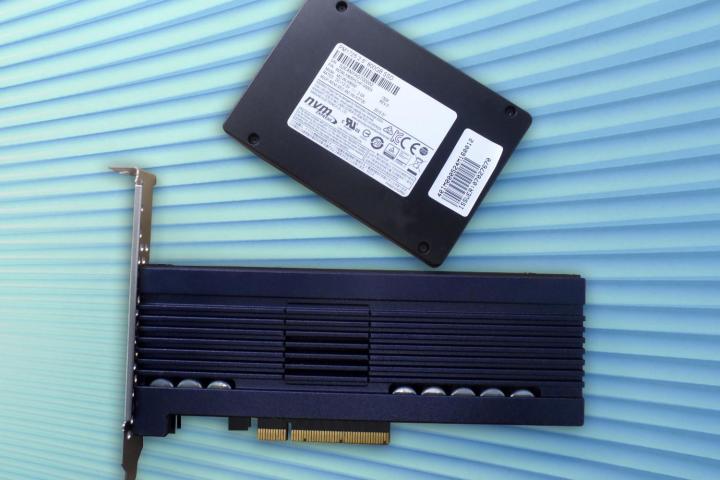
However, it’s not just the timing of this announcement that mimics Toshiba’s offering. Two of Samsung’s new devices — the PM1725 and the PM953 — are using the same NVMe (Non-Volatile Memory Express) technology that’s said to offer a host of performance advantages to Toshiba’s upcoming range of SSDs.
The PM1725 is said to be targeted towards the next-generation enterprise storage market. It’s a half-height, half-length card-type SSD, and it’s set to be offered with a 3.2TB or 6.4TB capacity. Both models can save a 5GB video in less than three seconds, and the larger option has been built to withstand five writes to full capacity every day for five years — a key feature for enterprise users focused on reliability.
That device will be joined by the PM1633, a less powerful SAS SSD that’s set to be offered as a 2.5-inch drive at capacities of 480GB, 960GB, 1.92TB and 3.84TB. While this product won’t take advantage of NVMe, it joins the other two SSDs being announced in using Samsung’s 3-bit multi-level-cell NAND flash memory.
Toshiba is pitching its BG1 SSD as the world’s smallest NVMe drive of this kind, but Samsung is happy to position their PM953 as an update to the industry’s very first NVMe SSD. The update will be released as an M.2 drive with capacities of 480GB and 960GB, or as a 2.5-inch drive with 480GB, 960GB and 1.92TB variants.
It seems clear that NVMe is going to be a major influence on the storage market in the immediate future, but what’s less clear is which manufacturer will be able to use the technology to its full potential. Samsung might have a head start on Toshiba, but it seems that this installment of the storage wars is only just beginning.
Editors' Recommendations
- The Samsung 990 Pro SSD is built for PS5 and DirectStorage
- The Samsung Odyssey Neo G8 is the new benchmark for 4K monitors — and I saw it
- Samsung’s new S8 high-resolution monitors boast more sustainable design
- Evidence points to Samsung adopting a new name for its next flagship range
- Samsung’s new Chromebook 4 sports a beautiful MacBook-inspired unibody design


